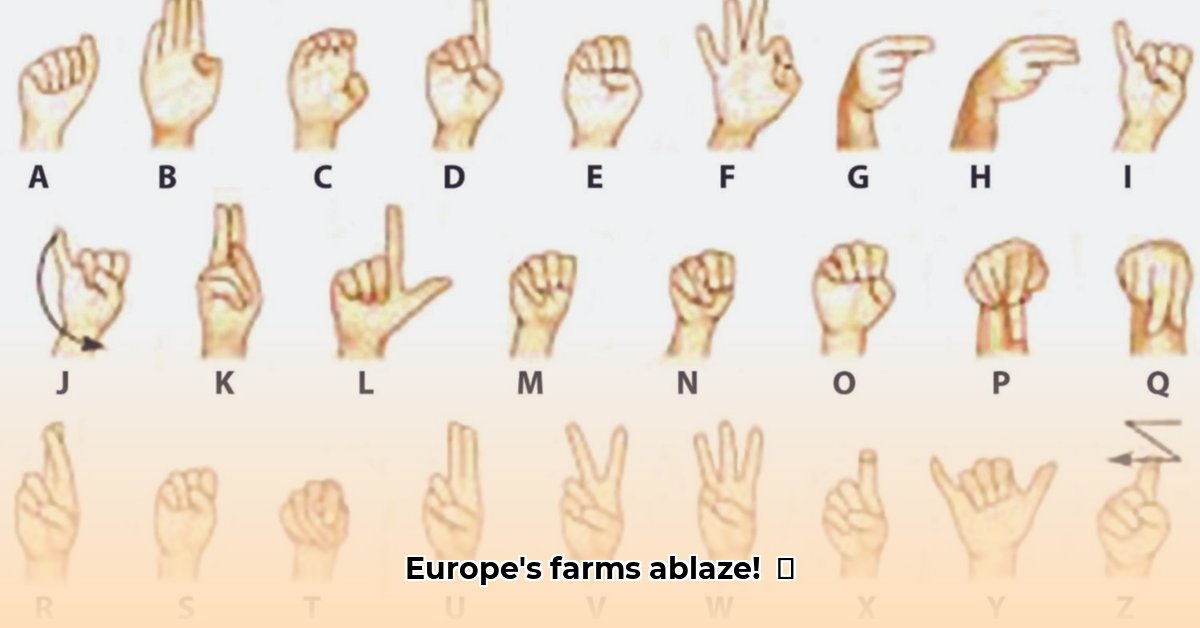
'n Brand Nuwe Krisis vir Boere in Suidelike Europa
The recent wildfires scorching Southern Europe are more than just a headline-grabbing disaster; they represent a profound crisis for the region's agricultural sector. These aren't isolated incidents; they're a stark illustration of the growing impact of extreme weather events on sustainable farming practices. The consequences extend far beyond the immediate devastation, impacting soil health, water resources, and the livelihoods of countless farming families. But amidst the ashes, there's a glimmer of hope – a chance to learn from this tragedy and build a more resilient future for Southern European agriculture.
Die Onmiddellike Verwoesting: Meer as Net Rook en Spieëls
The immediate aftermath is utterly heartbreaking. Fields cultivated for generations are reduced to ash in a matter of hours, leaving farmers with nothing but the charred remains of their livelihoods. Animals perish, homes are destroyed, and the emotional toll on these communities is immense. Many farmers, already struggling with drought and other climate change impacts, are facing a crisis of unimaginable proportions. The sheer scale of destruction is simply staggering; how can they possibly recover?
Die Langtermyn-Littekens: 'n Stadige Brand
The damage, however, extends far beyond the immediate devastation. The fires leave behind a trail of long-term consequences. Soil fertility is severely compromised, impacting future crop yields and leaving land barren for years. Water sources become contaminated, threatening both human health and livestock. The region's delicate ecosystems are thrown into disarray, resulting in biodiversity loss and long-term environmental damage. The recovery process will be slow, arduous, and expensive. Professor Elena Rossi, Head of Soil Science at the University of Florence, highlights how, "The destruction of topsoil can take decades to recover, hindering sustainable agricultural practices for generations to come."
Terugveg: 'n Veeldoelige Benadering
Addressing this multifaceted crisis requires a concerted, multi-pronged approach. Simply reacting to wildfires is inadequate; we need a proactive strategy focused on prevention, adaptation, and recovery.
Onmiddellike Hulp: Providing immediate financial and material assistance to affected farmers is paramount. This involves emergency relief funds, access to insurance payouts, and prompt distribution of crucial supplies. Dr. Marco Bianchi, a leading agricultural economist at the University of Bologna, emphasizes the need for "swift action to ensure farmers have the resources to rebuild their farms and livelihoods."
Voorkoming van Toekomstige Brande: Investing in wildfire prevention measures is crucial. This includes creating firebreaks, implementing controlled burns under expert supervision, modernising early warning systems, and improving forest management techniques. A proactive approach will save countless lives and reduce the long-term economic losses.
Volhoubare Boerderypraktyke: The crisis underscores the need for climate-smart agriculture. This involves adopting drought-resistant crops, water-efficient irrigation systems, crop diversification, and more sustainable land management practices.
Beleidsveranderinge: Governments must play a crucial role, updating land-use regulations, offering incentives for sustainable farming, and developing robust disaster preparedness and response plans. Comprehensive crop insurance tailored to wildfire risks is essential.
Navorsing en Innovasie: Continued research is crucial to understand the full impact of wildfires on soil health, water quality, and biodiversity. This knowledge will inform more effective restoration methods and prevention strategies.
Uitdagings en Oplossings: 'n Opsomming
| Uitdaging | Oplossing |
|---|---|
| Onmiddellike Verliese van Gewasse | Noodhulp, versekering, diversifisering van gewasse en veeteelt |
| Beskadigde Infrastruktuur | Beter infrastruktuur, verbeterde boukodes om uiterste weerstoestande te weerstaan |
| Grondverslegting | Grondbewaring, organiese boerdery, herbebossingsprojekte |
| Besmette Waterbronne | Verbeterde waterbestuur, water suiwering stelsels |
| Verlies van Biodiversiteit | Habitatrestourasie, bevordering van inheemse plante en diere, volhoubare grondbestuur |
The impact of these wildfires is far-reaching, but the response does not need to be. By adopting a collaborative and proactive approach, focusing on both immediate relief and long-term solutions, Southern Europe can emerge from this crisis stronger and more sustainable than before. The future of farming in Southern Europe depends on it.